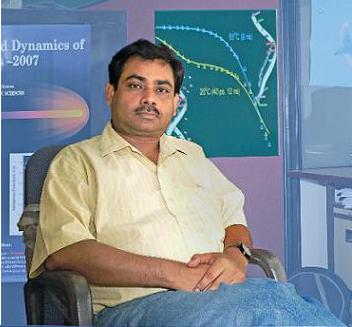|
I. Educational Background:
B. Sc.: Presidency College, Calcutta
University , India (1987)
M. Sc.: Rajabazar Science College,
Calcutta University, India (1989)
Ph D: Department of Physics, IISc,
Bangalore (1995), India (1995)
II. Professional Experience:
Post-Doctoral Reseach: AMOLF,
Amsterdam, The Netherlands (1999)
Faculty – S.N. Bose National
Centre for Basic Sciences, Kolkata (since Nov., 1999)
Visiting Scientist in SFB-TR6 project
under Germany-The Netherlands collaboration
III. Broad Area of Research:
Statics and Dynamics of soft
matter systems including colloids, biomacromolecules and so
on:The primary methods are: (1) computer simulations based
on Molecular Dynamics, Monte Carlo and Brownian Dynamics;
(2) Mean field calculations based on classical density
functional theories.
IV. Problems currently undergoing:
The problems can be largely categorized into three classes as
described below: A. Studies on
Bio-macromolecular complexes:
We perform detailed computation and theoretical analysis on
conformational changes in biomacromolecular complexes, like,
protein-metal ion, protein-protein, protein-ligand structures
which forms the heart of allbiochemical activities.
- Microscopic insight on protein functions:We
have developed a method for calculating the thermodynamics
of conformational changes in bio-molecular complexes based
on the distribution of the dihedral angles. Based on this we
seek microscopic view of protein functions.
- Dynamic aspects of conformational
fluctuations:We probe in detail how the time dependent
fluctuations of the dihedral angles are correlated to show
the connection between the structure and dynamics. In
particular, we examine the long distance communication in
proteins based on simulations and theoretical modeling.
- Quantum Mechanical effects:The coordination
of metal ions to a protein leads to substantial electronic
redistribution which governs the stability of
metallo-proteins. This leads us to undertake ab-initio
calculations for metal binding regions, using density
functional theory.
B. Modeling large scale behavior of bio-macromolecular
systems:
The behavior of a system comprising of
bio-nacroemolecules are addressed by statistical mecahanical
theories.
| |
- The aggregation behavior and dynamics of
proteins investigated by statistical mechanical theories and
computer simulations.
- The kinetics of bio-molecular reactions by
theoretical modeling and computer simulations.
C. Equilibrium and non-equilibrium studies on
colloidal systems:
Colloidal systems represent a model soft matter system
which can be used to study the condensed matter properties
both in equilibrium and out of equilibrium.
- Effective forces:The medium generated
effective forces on the colloids add to the direct
interaction between them, resulting in mutual effective pair
interaction which controls their phase behaviour and
dynamics. We study the effective colloidal forces, their
tenability and consequences in phase behaviours in the
presence of an external potential.
- Probing dynamics in colloids under external
perturbations:Colloidal particle dynamics probed via the
time dependent probability distributions of the particle
displacement under a variety of external perturbations, like
external potentials and confinement.
Significant recent publications:
Quantum chemical studies on
the role of residues in calcium ion binding to Calmodulin.
S.Sikdar, M.Ghosh, M. De Raychaudhury and J. Chakrabarti, Chem
Phys Lett, 2014, 605, 103 (2014).
A microscopic insight from
conformational thermodynamics to functional ligand binding
in proteins. S.Sikdar, J.Chakrabarti and M. Ghosh, Mol
Biosyst, 10, 3280 (2014).
Conformational contribution
to thermodynamics of binding in protein-peptide complexes
through microscopic simulation Amit Das, J. Chakrabarti
and Mahua Ghosh Biophysical Journal, 104, 1274 (2013).
Cross-over between central
and non-central conservative effective forces in a
modulated colloidal fluid C. Basu Chaudhuri, S.
Chakrabarty and J. Chakrabarti, J. Chem. Phys. ,
139, 204903 (2013).
Dimensional crossover in
fluids under nanometer-scale confinement A. Das and J.
Chakrabarti, Phys. Rev. E (rapid comm), 85,
050601(R) (2012).
High-Affinity Quasi-Specific
Sites in the Genome: How the DNA-Binding Proteins Cope
with them J. Chakrabarti, Navin Chandra, Paromita Raha,
and Siddhartha Roy, Biophysical Journal, 101, 1123
(2011).
|
